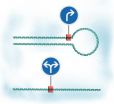(Press-News.org) In certain toy racecar tracks, sneaky players can flip a switch, trapping their opponents' vehicles in a loop of track. Cells employ a less subtle approach: they change the track's layout. In a study published online today in Science, scientists at the European Molecular Biology Laboratory (EMBL) and Oxford University discovered that, by forming or undoing gene loops, cells manipulate the path of the transcription machinery – which reads out instructions from DNA – controlling whether it moves along the genetic material in one direction or two.
"We found that gene loops can turn bi-directional promoters into one-way systems," says Lars Steinmetz, who led the work at EMBL.
Three years ago, Steinmetz's lab discovered that when the transcription machinery lands on most genes' promoters – the sequences that mark where transcription should start – it moves not only along the gene, but also in the opposite direction, along the other 'lane' of DNA. But they were somewhat surprised that this didn't happen everywhere: some genes, it seemed, had promoters that worked only one-way. Nicholas Proudfoot's group at Oxford University, in the meantime, discovered that genes can bend into a loop, so that when the transcription machinery reaches the end of the gene, it finds itself back at the beginning and starts again, like a trapped toy car. Proudfoot's group also found that inactivating a specific protein prevented these gene loops from forming.
Looking throughout the whole genome of yeast cells, Steinmetz, Proudfoot and colleagues have now found that when genes with 'one-way' promoters can't form loops, transcription from those promoters becomes bi-directional. It seems that with no transcription 'cars' trapped in a loop, more are free to move in the opposite direction. And by doing so, they can affect other genes. So by forming or undoing gene loops, cells can control not only what happens to the looping genes themselves, but also adjust the spread of regulation throughout the genome.
The researchers would now like to understand how and when loops form, for instance in response to changes in a cell's environment, and how unlooping affects the transcription of short DNA sequences within the gene. And Steinmetz has another burning question: what happens in cases where a promoter activates transcription of two genes? "Are they each in a loop? What's going on there?" he wonders.
INFORMATION:
Loop the loop, DNA style
1- or 2-way transcription depends on gene loops
2012-09-28
ELSE PRESS RELEASES FROM THIS DATE:
Nanosciences: All systems go at the biofactory
2012-09-28
In order to assemble novel biomolecular machines, individual protein molecules must be installed at their site of operation with nanometer precision. LMU researchers have now found a way to do just that. Green light on protein assembly!
The finely honed tip of the atomic force microscope (AFM) allows one to pick up single biomolecules and deposit them elsewhere with nanometer accuracy. The technique is referred to as Single-Molecule Cut & Paste (SMC&P), and was developed by the research group led by LMU physicist Professor Hermann Gaub. In its initial form, it was only ...
What makes surgeons happy?
2012-09-28
TORONTO, Sept. 28, 2012—Lack of control over operating rooms and other resources as well as a lack of work-life balance are among the main reasons general surgeons may be dissatisfied with their jobs, a new study has found.
The study was led by Dr. Najma Ahmed, a trauma surgeon at St. Michael's Hospital, at a time when both the Association of American Medical Colleges and the Canadian Medical Association have reported a decline in the number of general surgeons due to low recruitment, poor retention and early retirement.
Dr. Ahmed said that since the general surgery ...
Study ties early menopause to heart attack, stroke
2012-09-28
Women who experience early menopause are more likely to have a heart attack or stroke than women whose menopause occurs at a later age, according to a new study by Melissa Wellons, M.D., assistant professor of Medicine in the Vanderbilt Division of Diabetes, Endocrinology and Metabolism.
Wellons conducted the research while working at the University of Alabama-Birmingham and it is published in the current issue of Menopause: The Journal of The North American Menopause Society.
She said the study is especially important because cardiovascular disease is the leading cause ...
When your eyes tell your hands what to think
2012-09-28
EVANSTON, Ill. --- You've probably never given much thought to the fact that picking up your cup of morning coffee presents your brain with a set of complex decisions. You need to decide how to aim your hand, grasp the handle and raise the cup to your mouth, all without spilling the contents on your lap.
A new Northwestern University study shows that, not only does your brain handle such complex decisions for you, it also hides information from you about how those decisions are made.
"Our study gives a salient example," said Yangqing 'Lucie' Xu, lead author of the ...
Study reveals wide discrepancy in multidrug surveillance among intensive care units
2012-09-28
Washington, DC, September 28, 2012 – Screening practices for multidrug-resistant organisms (MDROs) in intensive care units (ICUs) vary widely from hospital to hospital, according to a new study published in the October issue of the American Journal of Infection Control, the official publication of the Association for Professionals in Infection Control and Epidemiology (APIC).
The P-NICE interdisciplinary research team from the Columbia University School of Nursing collected and analyzed survey responses from the infection preventionists (IPs) of 250 hospitals that participated ...
Language and perception – Insights from Psychological Science
2012-09-28
New research published in Psychological Science, a journal of the Association for Psychological Science, examines the nuanced relationship between language and different types of perception.
Bilingual Infants Can Tell Unfamiliar Languages Apart
Speaking more than one language can improve our ability to control our behavior and focus our attention, recent research has shown. But are there any advantages for bilingual children before they can speak in full sentences? We know that bilingual children can tell if a person is speaking one of their native languages or the ...
Hospital observation units could save the health care system $3.1 billion
2012-09-28
Boston, MA – Previous research has shown that observation units in a hospital can be an efficient way to care for certain patients, but only about one-third of hospitals in the United States have such units. Now, researchers at Brigham and Women's Hospital (BWH) estimate that maximizing the potential of an observation unit in a hospital could result in $4.6 million in savings annually for the hospital and $3.1 billion in overall savings for the health care system in the United States. These findings are published online by Health Affairs and will also appear in the journal's ...
Penn immunologists find a molecule that puts the brakes on inflammation
2012-09-28
PHILADELPHIA — We couldn't live without our immune systems, always tuned to detect and eradicate invading pathogens and particles. But sometimes the immune response goes overboard, triggering autoimmune diseases like lupus, asthma or inflammatory bowel disease.
A new study led by University of Pennsylvania researchers has now identified a crucial signaling molecule involved in counterbalancing the immune system attack.
"The immune response is like driving a car," said Christopher Hunter, professor and chair in the Department of Pathobiology in Penn's School of Veterinary ...
Venice Lagoon research indicates rapid climate change in coastal regions
2012-09-28
Research undertaken by the University of Southampton and its associates in Venice has revealed that the sea surface temperature (SST) in coastal regions is rising as much as ten times faster than the global average of 0.13 degrees per decade.
Researchers believe that this is partly as a result of a process known as the 'urban heat island effect'; where regions experiencing rapid industrial and urban expansion produce vast amounts of heat, making the area warmer than its surroundings.
Professor Carl Amos of Ocean and Earth Sciences at the University of Southampton, ...
Songs in the key of sea
2012-09-28
Soft horns and a tinkling piano form the backbone of "Fifty Degrees North, Four Degrees West," a jazz number with two interesting twists: it has no composer and no actual musicians. Unless you count bacteria and other tiny microbes, that is.
The song is the brainchild of Peter Larsen, a biologist at the U.S. Department of Energy's Argonne National Laboratory. Larsen, it turns out, has no musical training at all; his interests run less towards the blues and more towards blue-green algae.
When faced with an avalanche of microbial data collected from samples taken from ...
LAST 30 PRESS RELEASES:
Emerging class of antibiotics to tackle global tuberculosis crisis
Researchers create distortion-resistant energy materials to improve lithium-ion batteries
Scientists create the most detailed molecular map to date of the developing Down syndrome brain
Nutrient uptake gets to the root of roots
Aspirin not a quick fix for preventing bowel cancer
HPV vaccination provides “sustained protection” against cervical cancer
Many post-authorization studies fail to comply with public disclosure rules
GLP-1 drugs combined with healthy lifestyle habits linked with reduced cardiovascular risk among diabetes patients
Solved: New analysis of Apollo Moon samples finally settles debate about lunar magnetic field
University of Birmingham to host national computing center
Play nicely: Children who are not friends connect better through play when given a goal
Surviving the extreme temperatures of the climate crisis calls for a revolution in home and building design
The wild can be ‘death trap’ for rescued animals
New research: Nighttime road traffic noise stresses the heart and blood vessels
Meningococcal B vaccination does not reduce gonorrhoea, trial results show
AAO-HNSF awarded grant to advance age-friendly care in otolaryngology through national initiative
Eight years running: Newsweek names Mayo Clinic ‘World’s Best Hospital’
Coffee waste turned into clean air solution: researchers develop sustainable catalyst to remove toxic hydrogen sulfide
Scientists uncover how engineered biochar and microbes work together to boost plant-based cleanup of cadmium-polluted soils
Engineered biochar could unlock more effective and scalable solutions for soil and water pollution
Differing immune responses in infants may explain increased severity of RSV over SARS-CoV-2
The invisible hand of climate change: How extreme heat dictates who is born
Surprising culprit leads to chronic rejection of transplanted lungs, hearts
Study explains how ketogenic diets prevent seizures
New approach to qualifying nuclear reactor components rolling out this year
U.S. medical care is improving, but cost and health differ depending on disease
AI challenges lithography and provides solutions
Can AI make society less selfish?
UC Irvine researchers expose critical security vulnerability in autonomous drones
Changes in smoking status and their associations with risk of Parkinson’s, death
[Press-News.org] Loop the loop, DNA style1- or 2-way transcription depends on gene loops

